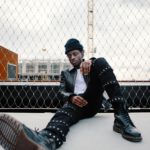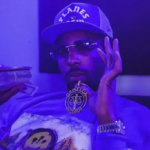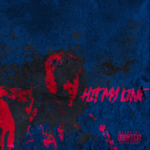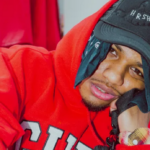The music industry can be ruthless. Thankfully, we have resources like William “Squeak” Watkins, Drumma Boy’s fabled manager, who believes in music education and helping artists through the highs and lows of the business.
Squeak, 50, knew he wanted to be in the music business back in 1998, getting his start in engineering before transitioning into artist management. The Washingtonian and Atlanta-based artist manager went on to learn hard lessons about the business, experience incredible highs and lows, and establish longevity in a dog-eat-dog business.
A proponent of TuneCore, ownership, and artist education, Squeak was kind enough to give me his time to break down artist management, mistakes young artists make, successes, and more. Our conversation, lightly edited for content and clarity, follows below.
DJBooth: When did you realize you wanted to be in the music industry?
Squeak: I’m gonna say around ‘98. I was in LA… I had a group of friends already in the music industry [Terry Ross]. I used to partake in the parties, but I never got in the business. I always had an interest in music—I’m a fan of all genres. I had a conversation [with] a friend of mine who was partners with Noontime, and Noontime was big with Bad Boy—Biggie, Faith [Evans], Mary J. Blige, Toni Braxton. They had all the big producers and songwriters. We got to talking, and I was like, “I think I wanna start doing engineering.” He took me around to different studios to see DJ Quik and Ice Cube and took me to a movie set. All this LA stuff—rappers and R&B artists. He took me into the studio and introduced me to engineers, and I thought it was interesting.
When I went back to DC, I immediately enrolled in an engineering school. I got my certificate in that, and a year later, I was in Atlanta working at Noontime [Records] as an engineer. That’s how I got started. From there, I was working with the likes [of] Teddy Bishop, Jazze Pha, and during that time, they just threw me in with the wolves. Toni Braxton was coming in. LL Cool J. Jagged Edge. You were thrown in with the folks that [were] already popping. I was with Polow da Don. By being in there, I learned so much on the technical side and the manager side. I got to sit in meetings with A&Rs at Sony. I was starting to be like, “I’m digging this management role.”
It kinda got thrown on me by working with Jazze’s manager Noonie Lee. I was dealing with day-to-day: sessions, booking sessions, agreements, split sheets, everything. I was digging this because it had more of my management background. Engineering was a stepping stone, but it didn’t allow me to live the way I wanted to live.
What about your character makes you a good artist manager?
Knowing how to network. My past, before I got [into music], allowed me to breeze through networking. Growing up, we networked by going to different neighborhoods and meeting different people, playing sports in different cities… You learned how to network at a young age. By the time I graduated from high school, I was able to build those skills up. In turn, when I used that towards being a manager, I was able to build relationships. That’s important.
You learn how to nurture those relationships, and that’s one of the most important things about being an artist manager. It’s gonna be a lot of things you don’t like; people that say, “No,” but you can’t take it personally. I have to continue to tell the artist: Your time will come. In this business, you gotta be patient. It’s a dog-eat-dog world. One day, you’re nothing. The next, your God’s gift. You gotta be thick-skinned. You can’t take anything personal. If you can handle that, you have a chance.
What was the first hard lesson you learned at the start of your career?
A guy pulled me to the side and said, “I see what you doin’, I like what you doin’, and I’m only tellin’ you this because I like what you doin’…” and these were his exact words, he said: “You gon’ to experience f*ckery. If you can handle that without pissing no one-off, you gon’ be okay.”
The experience I had was not being acknowledged for the hard work you put in on a project. You seeing all the accolades, but you’re getting nothing. That was a lesson for me to make sure I take control of those situations instead of allowing someone else to give you your flowers. That made me realize when we do writers splits; I have to make sure my name is on it. I have to make sure the contributions I put in [are] down. That was one of the first real hard lessons I had to learn: not to rely on someone else to acknowledge me and my work.
How has TuneCore been instrumental throughout your career?
It’s beneficial to the artist, and for the manager. It makes things easier for us to have a way of checking things. We can see where the record and artist can go. What I like about TuneCore, too, is it’s very open. It gives you a platform for artists and managers to see where we can take the song, how far we can go. With platforms like that, it makes it easier for us to make plans.
There’s ownership, too. You get to keep what’s yours.
The part of the business that young artists don’t understand is that part: ownership is important. I always tell my artists: I will always be honest with you and show you the game. The longer I keep you running, the better for all of us. I’m not looking for short-term. So, teaching artists ownership and bringing them to a platform where they can have ownership is important for me.
What’s the biggest mistake you see young artists making?
Not knowing their history. When you learn the history… If you’re an R&B artist, say, Michael Jackson. One of the reasons he was great was because he studied the artists before him, so his work ethic was strong. He studied James Brown, Jackie Wilson. He knew he had to work on his choreography, work on writing and production, on his media training, and persona. Artists today refuse to study artists before them. That’s why you have these artists come on social media and do the antics they do—artists before them did antics, but there was no social media, of course.
They don’t understand how important the fans are, either.We in a situation now where there’s no artist development. It’s who can do the craziest stuff to get the most attention. Then you’re getting likes, likes, likes, likes. It’s all about likes. The music may be trash, but it got a million views. That comes in with the labels. They be like, “What are their views? How many likes?” “The music is trash!” “Well, they have 5 million followers, so what can we say?” Now, we have artists worrying about their followers and who can be the craziest. There’s no one there to correct them.
What’s the biggest success of this new generation of artists?
I like what the new artists are doing! It’s exciting because they have more control than ever. We have a lot of smart kids out here, taking advantage of technology, making some serious boss moves. I like the new generation. I like the movement they have—nothing’s ever perfect—we need to talk more on the positive and see how we can take those positives [further]. When you look at Lil Baby and the R&B artists out here, they have great situations. I’m seeing a lot of artists take control of their careers and put business moves together as far as partnering with tech companies, clothing companies. I’m excited for the younger generation and [to] see how creative they can be, especially with this pandemic going on.
Let’s go back to the label comment. How can we get back to that artist development and supporting our artists?
The labels know what they doing, man. It’s bullshit. I can go back to the Biggie and Tupac days, how the labels fed into it. They was getting money off it! They don’t give a damn if these kids get killed. You die, your album sales go up. You know what I mean? Labels are supporting [the chaos]. At the end of the day, this is the music industry. We should be building a community. But you’re sitting here, seeing the destruction going on, and rewarding the destruction. The more chaos, the more money you’re putting behind it. I don’t think the labels will ever do anything to support artist development—I don’t think we’ll ever go back to that.





